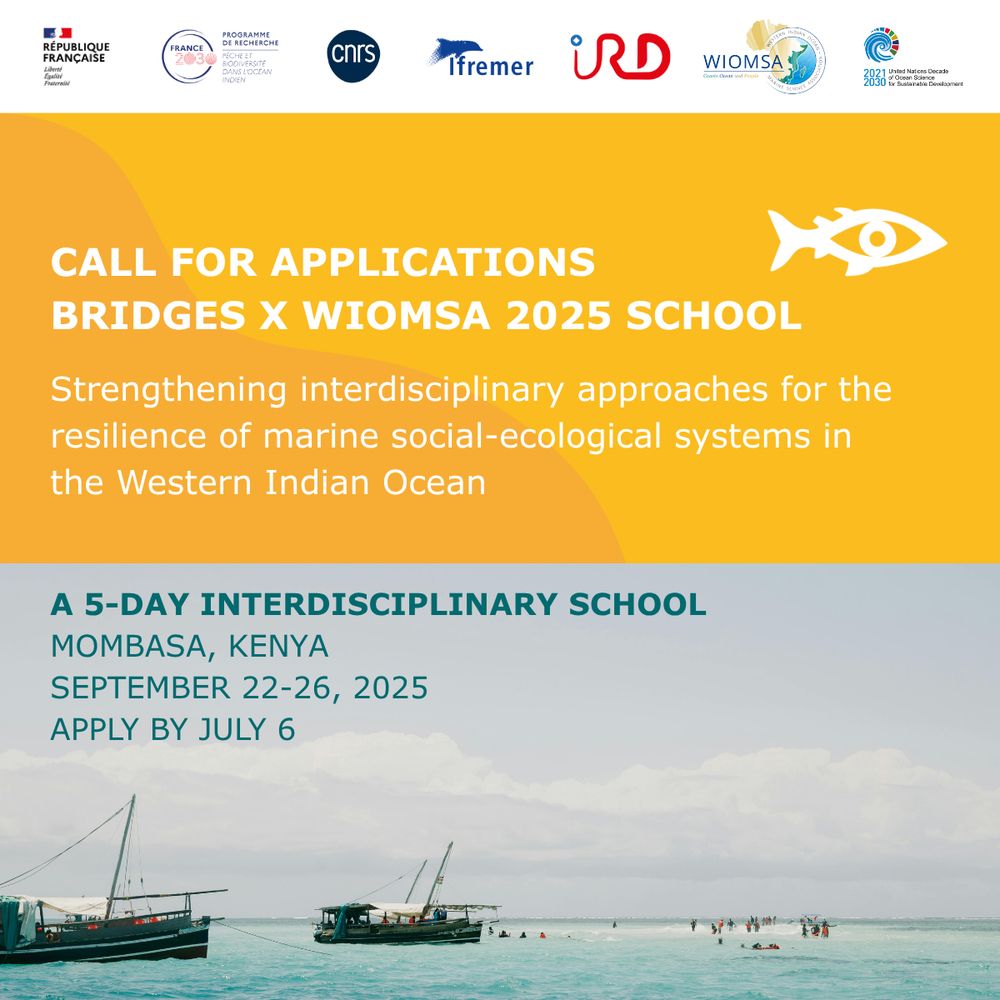
📣 Call for Applications!
BRIDGES x WIOMSA 2025 School
📍 Mombasa, Kenya | 🗓️ Sept 22–26, 2025
Explore tools & case studies to boost WIO marine SES resilience 🌊
Right before WIOMSA 2025 — combine both events!
🔗 Apply by July 6: survey.cnrs-dir.fr/index.php/19...
#BRIDGESResearch #WIOMSA2025
10.06.2025 06:22 — 👍 2 🔁 3 💬 1 📌 1
YouTube video by BRIDGES Research Program
Understand BRIDGES - BRIDGES RESILIENCE
[Series] Understanding BRIDGES – New Video Now Available! 🎬
We're excited to share another video in our "Understanding BRIDGES – Targeted Projects" series!
In less than 3 minutes, discover BRIDGES RESILIENCE, one of the targeted scientific projects.
@stephaniedagata.bsky.social
25.03.2025 10:37 — 👍 1 🔁 1 💬 1 📌 0

Risk and resilience in the face of climate change: understanding in order to act - PEPR BRIDGES
Assessing risk and maximising resilience The resilience of a social-ecological system is ‘its capacity to absorb disturbances of natural or human origin and to reorganise itself so as to maintain its ...
🌟 [Series] Understanding BRIDGES - New article available! 📖
Mapping socio-ecological risks and coming up with proposals for more resilient public policies: that's one of the missions of BRIDGES RESILIENCE. 🐟 🎣 🌱
@stephaniedagata.bsky.social | @ifremer.bsky.social | @ird-fr.bsky.social
28.03.2025 06:45 — 👍 3 🔁 1 💬 0 📌 0
A sustainable ocean needs thriving ocean societies | Nature
Letter to the Editor
⚠️Attention all ocean scientists! 🌊 A group of us just wrote a piece in Nature explaining why the 2025 United Nations Ocean Conference declaration (#UNOC3) needs a “Supporting thriving ocean societies” section: rdcu.be/eakuB
07.03.2025 16:21 — 👍 6 🔁 3 💬 1 📌 0
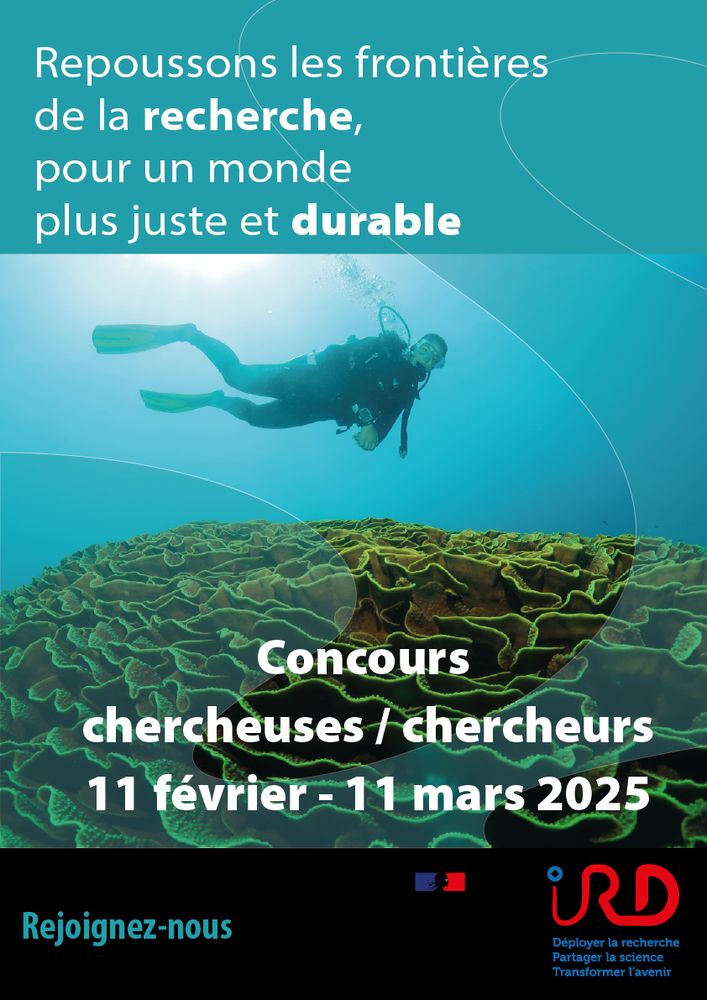
FR--
Les concours de chercheurs/chercheuses 2025 de l'IRD ouvriront très bientôt... 🧠 🐾 🐠 🦟 🌾 🌽 🌋 🥼 💻 🔬 📊
👇
www.ird.fr/concours-che...
30.01.2025 16:49 — 👍 3 🔁 3 💬 0 📌 0

Science under threats !
A call to action addressing global threats to academic research. From public mistrust to barriers in collaboration, this paper outlines solutions to safeguard science and advance progress.
👉 G. Piret et al. in @theinnovation.bsky.social
doi.org/10.1016/j.xi...
🌐🧪
29.01.2025 12:22 — 👍 22 🔁 8 💬 1 📌 0
Great project, great team!
21.01.2025 10:36 — 👍 2 🔁 0 💬 0 📌 0
How to quit X without losing all your archives and informations? Use @helloquittex.bsky.social developped by @cnrs.bsky.social. And it's available in several languages!🙏
21.01.2025 08:36 — 👍 0 🔁 0 💬 0 📌 0
On this symbolic day, I let go of my X account. Feeling lighter, freer, and more aligned with my values 🙌🌟
20.01.2025 11:16 — 👍 2 🔁 0 💬 0 📌 0
10 days left to apply! 🐠
17.01.2025 08:05 — 👍 0 🔁 0 💬 0 📌 0
Nice introduction to the BRIDGES program in the SWIO!🐟
14.01.2025 15:08 — 👍 0 🔁 0 💬 0 📌 0
YouTube video by BRIDGES Research Program
BRIDGES Research Program - Fisheries and Biodiversity in the Western Indian Ocean
🌍Welcome to the BRIDGES Research Program account!🌊
This €28M, 10-year program explores global changes impacts on marine/coastal socio-ecosystems in the SW Indian Ocean. Led by CNRS, Ifremer & IRD, it fosters collaboration to improve fisheries governance, biodiversity conservation & resilience.
07.01.2025 09:54 — 👍 4 🔁 3 💬 1 📌 0

PEPR BRIDGES : Fisheries and biodiversity
The South-West Indian Ocean region is under severe pressure caused by climate and demographic changes coupled with ever-increasing demands for fishing resources.
Come and join the BRIDGES program!
🔬 Postdoc opportunity: Evaluate modeling tools adapted to the challenges of coastal sites in the SWIO
📍 Sète/La Réunion
⏳ 18 months from April 2025
🎯 Focus: Coastal ecosystem modeling tools analysis
👉 Details and application: www.bridges-wio.com/recruitment/
07.01.2025 08:25 — 👍 4 🔁 3 💬 0 📌 2
An important commentary from @nancyknowlton.bsky.social in @pnas.org about the fact that some coral reefs may persist in new degraded forms, but that this must not make us complacent. We need both local and global action now. Well worth a read....inspiring as ever: www.pnas.org/doi/10.1073/...
13.12.2024 09:32 — 👍 9 🔁 4 💬 1 📌 1


🚨Paper Alert 🚨
🎣 🚢 🌊 Regulations of activities and #protection #levels in marine protected areas (#MPAs) of the European Union (#EU): A dataset compiled from multiple data sources.
📰 doi.org/10.1016/j.di...
@cnrs.bsky.social @ocean-climate.bsky.social
10.12.2024 11:01 — 👍 7 🔁 2 💬 0 📌 0
Yay! @bsky.app now counted in @altmetric.com!
Now we just have to get the academic publishers to add Bluesky share buttons
(looking at you, @royalsociety.org, @science.org, @pnas.org, Wiley, @elsevierconnect.bsky.social, @cellpress.bsky.social, Frontiers, @plos.bsky.social ...)
02.12.2024 13:01 — 👍 58 🔁 22 💬 2 📌 1
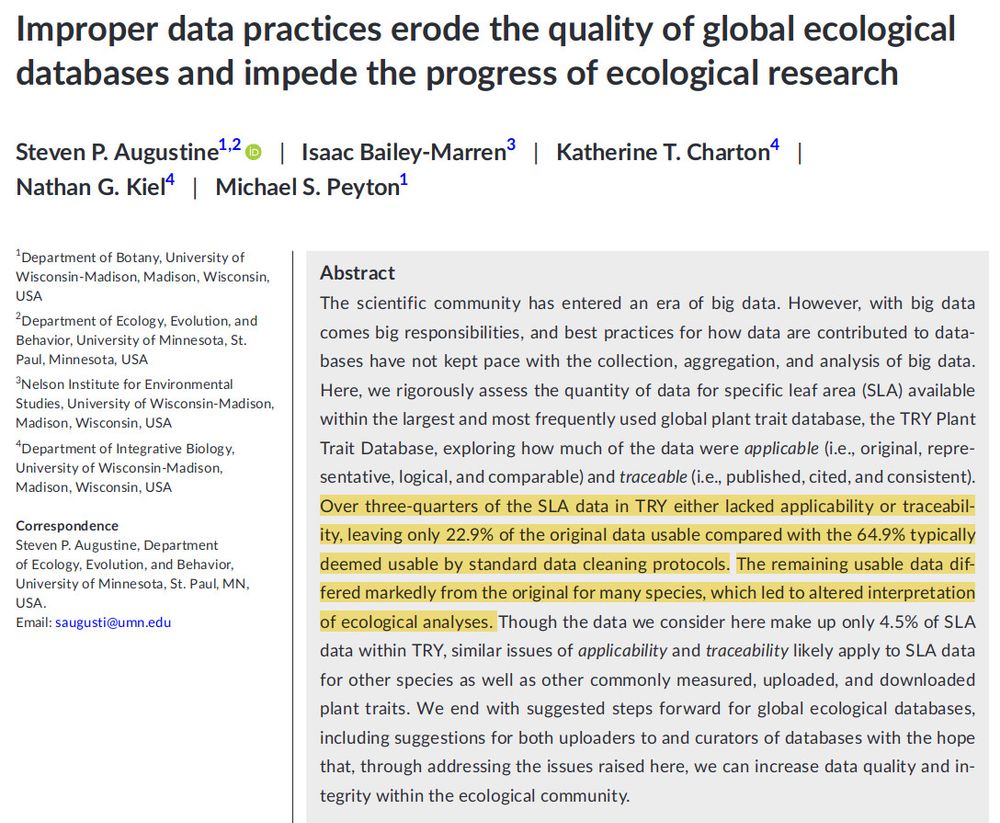
Improper data practices erode the quality of global ecological databases and impede the progress of ecological research
The scientific community has entered an era of big data. However, with big data comes big responsibilities, and best practices for how data are contributed to databases have not kept pace with the collection, aggregation, and analysis of big data. Here, we rigorously assess the quantity of data for specific leaf area (SLA) available within the largest and most frequently used global plant trait database, the TRY Plant Trait Database, exploring how much of the data were applicable (i.e., original, representative, logical, and comparable) and traceable (i.e., published, cited, and consistent). Over three-quarters of the SLA data in TRY either lacked applicability or traceability, leaving only 22.9% of the original data usable compared with the 64.9% typically deemed usable by standard data cleaning protocols. The remaining usable data differed markedly from the original for many species, which led to altered interpretation of ecological analyses. Though the data we consider here make up only 4.5% of SLA data within TRY, similar issues of applicability and traceability likely apply to SLA data for other species as well as other commonly measured, uploaded, and downloaded plant traits. We end with suggested steps forward for global ecological databases, including suggestions for both uploaders to and curators of databases with the hope that, through addressing the issues raised here, we can increase data quality and integrity within the ecological community.
1/ Important read for anyone using, contributing, or building large databases by aggregating data sources. Discusses issues with data quality, duplication, credit attribution, etc, and includes recommendations for improvement
doi.org/10.1111/gcb.... #ecopubs
29.11.2024 11:01 — 👍 99 🔁 39 💬 4 📌 4

Blue Africa - Ascend
The Blue Africa team seeks to ensure carbon storage efforts in African coastal and marine ecosystems are aligned with the needs of African people. By addressing key data gaps and empowering decision-m...
Really excited to kickstart our ASCEND BAOBAB synthesis team looking at Blue Africa: valuating Africa’s Marine Biodiversity, Carbon Sequestration Potential and Expected Livelihood Outcomes
Conservation International, UNESCO-IOC, BRIDGES @stephaniedagata.bsky.social
ascendclimate.org/blue-africa/
27.11.2024 13:37 — 👍 11 🔁 3 💬 0 📌 0
A feel good read 💌
19.11.2024 12:24 — 👍 1 🔁 0 💬 0 📌 0
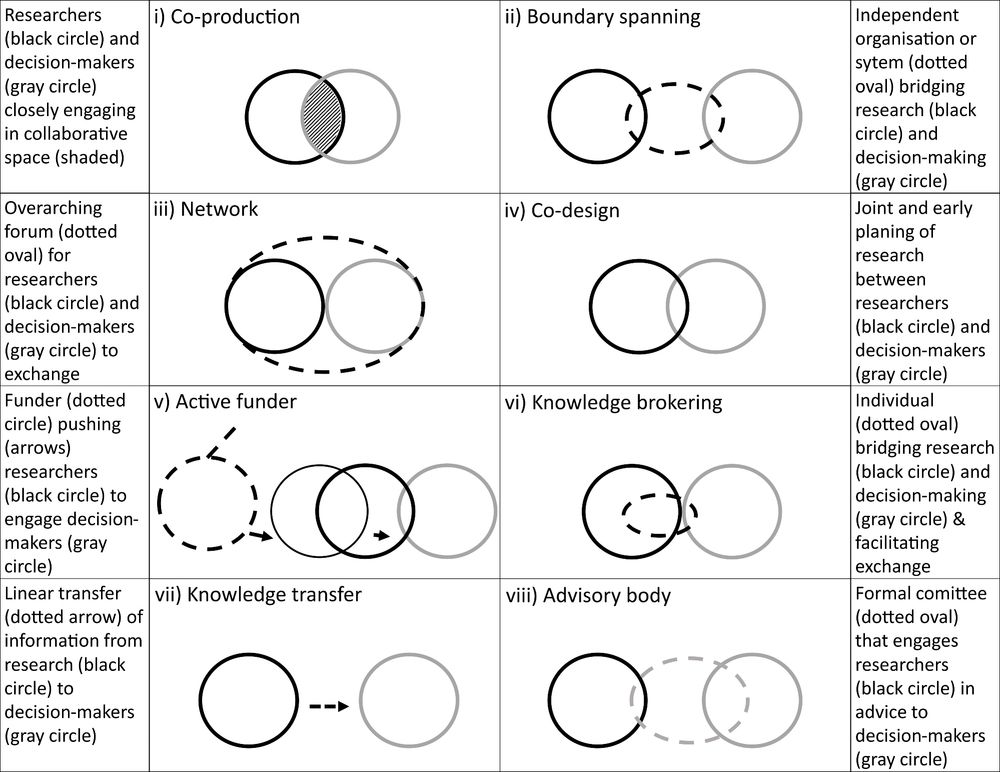
🪝New paper! We reviewed recent advances in marine science-policy knowledge exchange ⚓️
🌊More diverse strategies are used
🌊Progress in outcomes & enablers
🌊Critical research needs: marinstreaming, choice of strategy, value addition, use of AI
www.sciencedirect.com/science/arti...
15.11.2024 12:27 — 👍 11 🔁 6 💬 0 📌 0
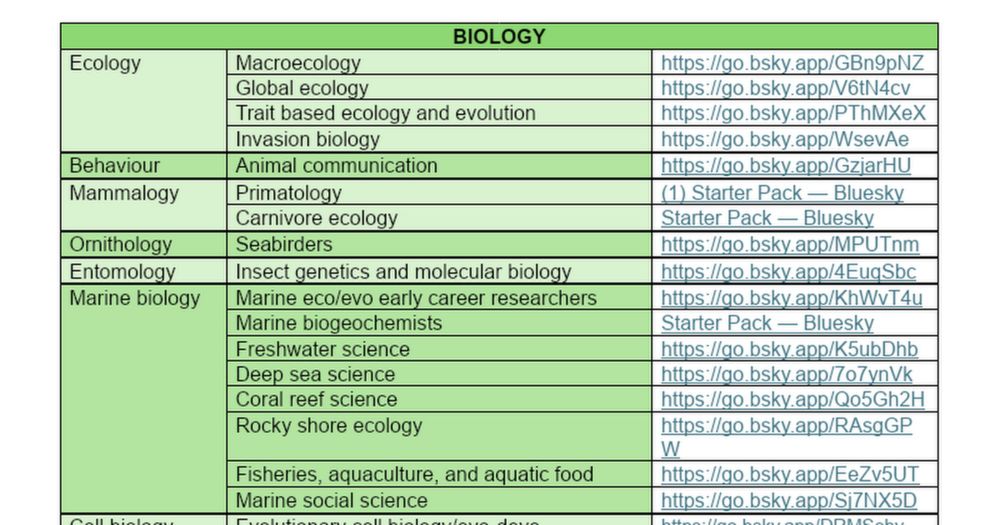
Starter packs
BIOLOGY Ecology Macroecology https://go.bsky.app/GBn9pNZ Global ecology https://go.bsky.app/V6tN4cv Trait based ecology and evolution https://go.bsky.app/PThMXeX Invasion biology https://go.b...
hey everyone! i made a list of some useful starter packs (primarily biology/earth sciences with a few bonus things thrown in) to share with friends who have joined bsky in the last week and thought it may be useful for some people here too! 🌍🧪 #SciSky #BioSky docs.google.com/document/d/1...
11.11.2024 17:41 — 👍 731 🔁 389 💬 78 📌 38
We are a WWF initiative working with Indigenous Peoples, coastal communities, regional networks, government authorities and NGOs to accelerate and scale coastal community-led conservation across the world.
📍 https://coastalcommunityledconservation.org/
Feminist political ecologist, parent, lover of the ocean. Author of Feminist Conservation @YUP. Prof @Middlebury College, PhD @UC Berkeley
Presses de Sciences Po, maison d'édition de sciences humaines et sociales. #shs #sciencespo #socio #droit #économie #international #histoire #santé #genre #climat
Média qui alerte sur un truc pas cool : le changement climatique
Nous soutenir : https://fr.tipeee.com/bon-pote
https://bonpote.com/
Associate Professor working on spatial and temporal dynamics of biodiversity using genomic tools
@EPHE_PSL
@psl-univ.bsky.social
--
@cefemontpellier
#fishguy #ichthyology
Marine scientist working at University of la Reunion island, lab ENTROPIE, on reef fish functional ecology
Cutting-edge research, news, commentary, and visuals from the Science family of journals. https://www.science.org
Researcher, professor, mom, outdoor enthusiast, global citizen
Stockholm Resilience Centre explores how people and nature can live and develop on a planet under pressure.
Intergovernmental Panel on Climate Change
Marine social scientist. Research Fellow at James Cook University / Australian Institute of Marine Science. Researching opportunities for just and equitable governance of marine systems
Senior Research Fellow & Australian Research Council DECRA Fellow at James Cook University | Environmental Social Scientist | conservation, sustainability, equity, human wellbeing, collaborative governance, OECMs
Summaries of all of the latest science on blue whales.
'Antarctic blue whale' rearranged is 'Let Branch wail at cue'.
Posts by Prof @TrevorABranch.bsky.social
Retrouvez toutes les informations sur https://fr.escape-x.org/
#HelloQuitteX #HelloQuitX #EscapeX
(Anciennement HelloQuitteX)
Principal association of coral reef scientists, managers, and enthusiasts worldwide. To promote acquisition & dissemination of scientific knowledge to secure coral reefs for future generations through reserach, education, policy. linktr.ee/icrs.links
🏝️ G. Nicholson PhD
🐠 Parrotfish trophodynamics
🔬 Coral reef cyanobacteria www.parrotfishresearch.org 🦜🐟
Aotearoa New Zealand
We measure the attention that research outputs receive from policy documents, mainstream news outlets, Wikipedia, social media and online reference managers. We detect sentiment of Bluesky/X posts.
Come for the attention to research. Stay for the memes.
Science News from Academic Journals etc.
Marine scientist | Human impacts on marine ecosystems | 📌 Helsinki, FI
Assistant professor in marine ecology @ CNRS | Program coordinator -
French Guiana
Biodiversity modeling & Innovative tech helping conservation - eDNA 🧬 BRUVS 📷 diving 🤿
🌊🐠🦈🦀


















